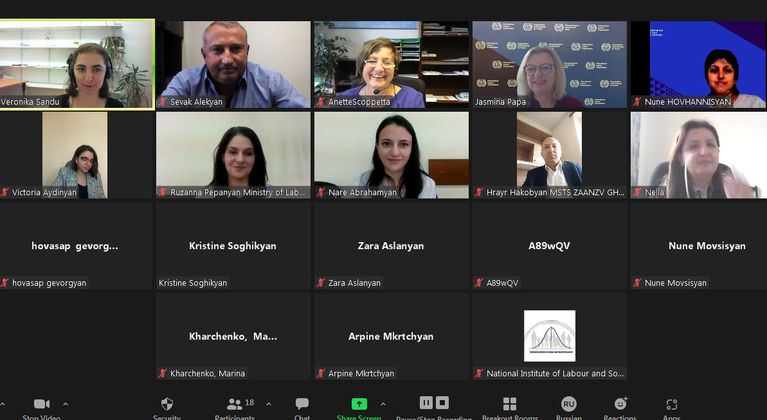Enhancing coordination of social protection and employment service delivery: a training in Armenia
Public Officials of the Ministry of Labour and Social Protection and Integrated Social Service Centres completed the training organised by the ILO Decent Work Technical Support Team and Country Office for Eastern Europe and Central Asia in collaboration with the European Centre for Social Policy Welfare and Research.

Building on a decade long, step by step reforms in social protection system, the Armenian Government created 49 Integrated Social Service Centres (ISSC) on the regional and local level which serve as a single point of contact for citizens requiring social security, employment, disability, social care and housing services. This requires that different professionals of ISSC, such as social workers, employment counsellors, legal advisors, psychologists work together. To overhaul these major innovations in social protection and employment services delivery, the Ministry of Labour and Social protection has been investing in capacity development of staff of Integrated Social Service Centres, in collaboration with development partners.
During the training the participants discussed the example of Davit1, social worker in one of ISSC who supports some fifty families, with a range of diverse needs – from basic income security, through child protection, to a need for re-skilling or up-skilling and labour market inclusion. Many people with whom Davit works are interested in finding jobs, preferably decent and stable. But they lack required skills, have never worked formally before, have low confidence or face different other challenges. Davit’s colleague Nella is employment counsellor in the same ISSC supporting job seekers to enter training programmes, public works and active labour market measures and find jobs. But many clients she works with need social assistance, counselling or other services. In practice, employment and social protection specialists at the ISSCs often work independently, although many clients require services of both professions.
Learning about integrated case management using case examples from Sweden, Norway, Lithuania, Austria and other countries, participants examined different stages of the process, roles and responsibilities of agents in the process and how to identify required resources including from non-governmental actors.
Above all, the focus was on collaboration. As one of the participants stated, “employment counsellors and social workers are one team and if the ultimate goal is income security, economic independence and inclusion, we need to apply case management from the perspective of our clients.”
The training programme was implemented in the framework of the Project Integrated policy response on employment and social protection in the context of COVID-19 crisis mitigation and recovery supported by social dialogue.
1 The name is invented and the situation described although hypothetical contains elements of situations discussed during trainings.